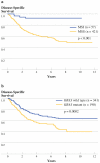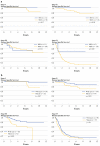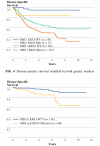KRAS mutation and microsatellite instability: two genetic markers of early tumor development that influence the prognosis of colorectal cancer
- PMID: 19813061
- PMCID: PMC4380015
- DOI: 10.1245/s10434-009-0713-0
KRAS mutation and microsatellite instability: two genetic markers of early tumor development that influence the prognosis of colorectal cancer
Abstract
Introduction: We examined two genetic markers established early in colorectal tumor development, microsatellite instability (MSI) and mutation of the KRAS proto-oncogene, to see if these genetic changes influence metastatic disease progression and survival.
Patients and methods: MSI and KRAS mutation status were assessed in 532 primary adenocarcinomas (stage I-IV) from patients treated by colon resection. Median follow-up was 4.1 years (range 0-13.3 years) overall, 5.4 years for survivors.
Results: MSI and KRAS mutation were detected in 12 and 36% of cases, respectively. MSI was more common in early-stage disease (I, 15%; II, 21%; III, 10%; IV, 2%; P = 0.0001). Prevalence of KRAS mutation did not vary with stage (I, 36%; II, 34%; III, 35%; IV, 40%; P = ns). Disease-specific survival was far superior for MSI tumors than for microsatellite stability (MSS) tumors (5-year survival 92 vs. 59%, P < 0.0001). KRAS mutation was a marker of poor survival (5-year survival 55 vs. 68%, P = 0.0002). Using Cox regression analysis MSI, KRAS mutation, and stage were strong independent predictors of survival in the entire patient population. A high-mortality group with MSS/KRAS-mutant tumors was identified within the stage I and II cohort.
Conclusions: MSI and KRAS mutation provide fundamental genetic signatures influencing tumor behavior across patient subsets and stages of tumor development.
Figures





References
-
- Skibber J, Minsky B, Hoff P. Cancer of the colon. In: DeVita VT, Rosenberg SA, editors. Principles and practice of oncology. Lippincott Williams & Wilkins; Philadelphia: 2001.
-
- Chapuis PH, Fisher R, Dent OF, Newland RC, Pheils MT. The relationship between different staging methods and survival in colorectal carcinoma. Dis Colon Rectum. 1985;28:158–61. - PubMed
-
- Barillari P, de Angelis R, Valabrega S, Indinnimeo M, Gozzo P, Ramacciato G, et al. Relationship of symptom duration and survival in patients with colorectal carcinoma. Eur J Surg Oncol. 1989;15:441–5. - PubMed
-
- Robinson M, Hardcastle J. Should we be screening for colorectal cancer? Br Med Bull. 1998;54:807–821. - PubMed
-
- Culliford A, Paty P. Surgery of colon cancer. In: Saltz L, editor. Colorectal cancer: multimodality management. Blackwell; Oxford, UK: 2002.
Publication types
MeSH terms
Substances
Grants and funding
LinkOut - more resources
Full Text Sources
Other Literature Sources
Medical
Miscellaneous

